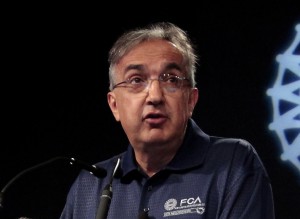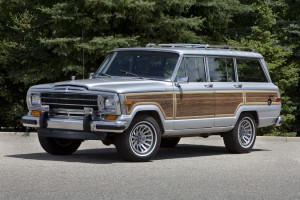
FCA Chief Sergio Marchionne sent a letter to the company's UAW employees telling them the new deal puts more money in their pockets.
In a letter to the employees of FCA U.S. Chief Executive Sergio Marchionne said the new tentative labor agreement with the United Auto Workers puts the company on a more cooperative and ultimately competitive footing.
“I believe this agreement, which still requires UAW member ratification, is a transformational deal because it guarantees that our workers will share equitably in the success we are able to generate working together while ensuring that our company will be able to remain competitive,” Marchionne said in his letter.
“This new contract represents a major step forward in enabling greater and more direct involvement of our workers in the achievement of the strategic objectives of FCA and recognizes the central role that you all play in building our common future. Without you and your commitment, our plan is simply unachievable,” he added.
Details of the agreement will be presented to local union representatives in the next couple of days. The tentative, four-year agreement includes $5.3 billion in new investment for new products that will be built at plants in the U.S. and union officials are counting on the fact that 43% of Chrysler 39,000 employees will be voting on a union pact for the first time.

The Jeep Grand Wagoneer is part of the product and plant shuffle that is part of the new labor deal.
However, the $5.3 billion investment also calls for a major re-alignment of FCA’s production plants, starting with turning the Sterling Heights (Michigan) passenger car assembly plant into a truck plant and moving production of the next generation Ram from Warren (Michigan) to Sterling Heights.
Warren would apparently become a swing plant building light trucks as well as the proposed Grand Wagoneer and the extra Grand Cherokees, FCA hopes it needs to satisfy export markets in the Europe and the Middle East.
Meanwhile, production of the Jeep Cherokee would move from Toledo, Ohio, to the FCA plant in Belvedere, Illinois, while the Toledo plant is re-tooled for the next generation Wrangler and perhaps a new Jeep pickup truck. Production of compact vehicles, such as the Dodge Dart, Chrysler 200 and Jeep Compass and Patriot, would all move to Mexico.
However, the moves also could trigger a backlash during ratification, particularly in Warren, a site of protests in the past, where workers could easily feel shortchanged and especially in Toledo where hundreds of local jobs could be put at risk by the shifts.
(FCA, UAW reach a tentative contract. For more, Click Here.)
Local union officials, whose support is critical to the ratification, had expected to keep production of the Cherokee and Wrangler and perhaps added a third vehicle. The old American Motors Corp. had built both the Grand Wagoneer and a pickup truck in Toledo.
The wording of Marchionne’s letter also gave rise to speculation that the FCA U.S. CEO had gotten the union blessing for a merger with General Motors. The union, though, hasn’t confirmed it has endorsed all of Marchionne’s “strategic objectives.”
Nonetheless, union support would be a necessary component of any merger. In 1998 when Daimler-Benz acquired the old Chrysler Corp., Kirk Kerkorian, who held a major position in Chrysler stock and stood to make a financial killing if the deal went through, made a point of flying to Detroit to meet personally with then UAW President Steve Yokich. Yokich later blessed the Daimler-Chrysler deal, noting he had no confidence in Chrysler’s existing management.
(Click Here for complete coverage of the 2015 Frankfurt Motor Show.)
In his “Dear Colleagues” letter, Marchionne said the tentative contract opens the way for paying workers more if the company meets certain key objectives, “while retaining the ability to control costs during a downturn so that we will be able to maintain an investment level necessary for long-range competitiveness.
“If the final plan targets are met, and I am confident they will be, workers will receive significant economic benefits tied directly to their commitment,” Marchionne said.
“Another important feature of the contract is establishment of a pathway to higher wages for workers hired under the two-tier pay structure, helping ensure that all those who work hard will be rewarded commensurate with others doing the same or similar jobs,” he said.
(To see more about why Daimler is moving its HQ to Detroit, Click Here.)
“In addition, we have agreed to adopt a comprehensive approach to address rising medical costs. We will partner with the UAW Health Care Development Co-op to explore innovative ways of improving the delivery of health-care benefits in a manner that increases quality, lowers costs and provides better patient care,” Marchionne noted in his letter.

SERGIO WINS, FCA EMPLOYEES LOSE AGAIN. IT APPEARS THAT THE UAW ROLLED OVER AND PLAYED DEAD ON THIS NEGOTIATION. AS LONG AS BILLIONS KEEP BEING FUNNELED TO THE SINKING SHIP FIAT/ALFA ROMEO THE UNION BROTHERS AND SISTERS DONT HAVE A CHANCE ON SEEING ANY KIND OF REAL MONEY AS PER BONUSES AND PROFIT SHARING. ITS LIKE BEING UNDER THE THUMB OF DAIMLER AGAIN. 🙁
It seems quite costly to switch production facilities for so many models. One would hope that management has properly done their research because with FCA being cash poor, all of these changes cost big bucks.
I wonder if the new UAW contract states that all senior level execs will work for $1/yr. total compensation in any economic down turns to match prior and potential future employee concessions? Considering the employees don’t make the strategic decisions that got FCA into a cash poor situation or GM and FCA into bankruptcy, it would be appropriate for the management, not the workers to make concessions and/or be terminated.